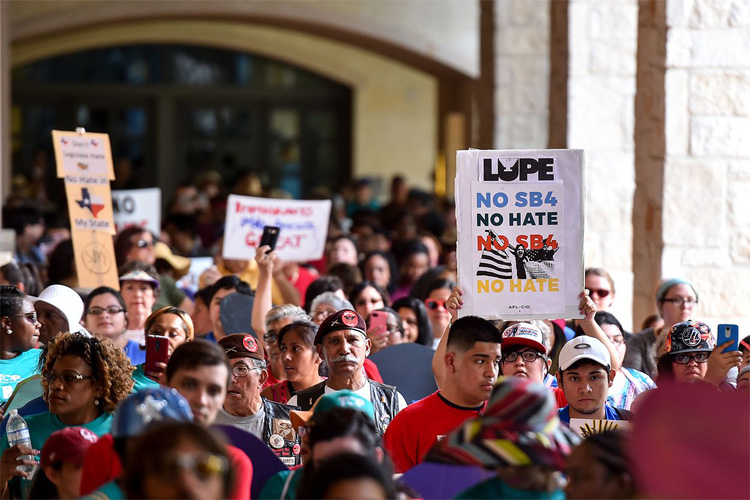
MONDAY: Appeals Court Allows More Of Texas “Sanctuary Cities” Law To Go Into Effect
A three-judge panel of appellate judges on Monday ruled that parts of the state’s immigration-enforcement legislation, Senate Bill 4, can go into effect while the case plays out on appeal.
A three-judge panel of appellate judges on Monday ruled that parts of the state’s, Senate Bill 4, can go into effect while the case plays out on appeal.
Last month, U.S. District Judge Orlando Garcia halted the part of the bill that required jail officials to honor all detainers. He also blocked other sections that prohibit local entities from pursuing “a pattern or practice that ‘materially limits’ the enforcement of immigration laws” and another that prohibits “assisting or cooperating” with federal immigration officers as reasonable or necessary.
While a hearing on the state’s appeal of that ruling is scheduled for November 6, the panel of U.S. 5th Circuit Court of Appeals judges ruled Monday that the detainer provision can stand for now. They panel ruled however, that based on its interpretation of the law, the part that requires local jails to “comply with, honor and fulfill” detainers does not require detention based on every detainer issued.
“The comply with, honor, and fulfill’ requirement does not require detention pursuant to every ICE detainer request,” the panel wrote. “Rather, the ‘comply with, honor, and fulfill’ provision mandates that local agencies cooperate according to existing ICE detainer practice and law.” The court also ruled that jails do not need to comply if a person under a detainer request provides proof of lawful presence.
The court didn’t lift Garcia’s block on sections of the bill that prohibit local entities and college campuses from limiting cooperation with law enforcement, either through adopting or enforcing policies or through a pattern or practice. The court held that the word “limit” could be too broadly interpreted and left a decision up to the matter for the subsequent panel.
“We conclude that the defendants have acknowledged that the reach of the word “limit” could be too expansive and have offered qualifying interpretations,” the judges wrote. “We conclude that such interpretations are best left for the time when this court’s ruling would have more finality. That time is to be set by the merits panel.”
The court offered a mixed ruling on another controversial item in the bill, a section of the law that prevents local governments from “adopting, enforcing or endorsing” policies that specifically prohibit or limit enforcement of immigration laws. The judges kept that injunction in place, but said it only applies to the word “endorse.” The bill, as passed and signed, would have made elected and appointed officials subject to a fine, jail time and possible removal from office for violating all or parts of the legislation, and opponents keyed in on the “endorsement” provision as something that would open up most officials to possible fines and jail time.
Texas Attorney General Ken Paxton praised the decision, and said his office was confident the entire bill would subsequently be found constitutional.
“We are pleased today’s 5th Circuit ruling will allow Texas to strengthen public safety by implementing the key components of Senate Bill 4,” Paxton said in a statement. “Enforcing immigration law helps prevent dangerous criminals from being released into Texas communities.”
Democrats said the state was using delay tactics that would disenfranchise Texas’ minorities.
“Texans cannot wait nor afford another round of years-long litigation while this law tears families apart and sows distrust of and confusion among our law enforcement agencies,” said state Rep. Eddie Rodriguez, D-Austin. “If the court allows the state’s delay tactics to succeed, it will further normalize Texas Republicans’ dysfunctional one-party rule and condemn Texas Latinos to living under a cloud of uncertainty and fear.”
This story originally published by The Texas Tribune.





